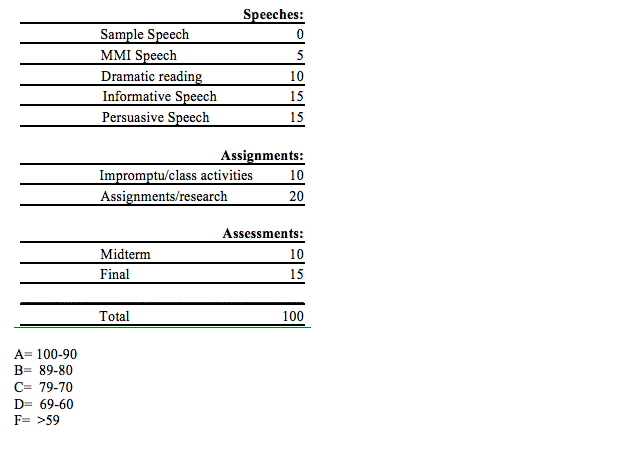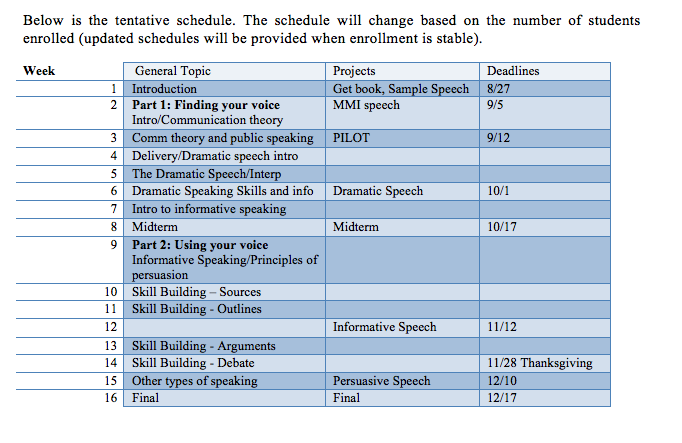Instructor: Prince K. White
Sacramento City College
Communication Studies 301 (COMM 301) 3 Units
Tuesdays and Thursdays 9:00-10:20 and
Tuesdays and Thursdays 1:00-2:20
Office hours: Tuesdays and Thursdays 2:20-3:20 (PAC 134) and By appointment M-F
E-mail Addresses:
[email protected]
[email protected]
Sacramento City College
Communication Studies 301 (COMM 301) 3 Units
Tuesdays and Thursdays 9:00-10:20 and
Tuesdays and Thursdays 1:00-2:20
Office hours: Tuesdays and Thursdays 2:20-3:20 (PAC 134) and By appointment M-F
E-mail Addresses:
[email protected]
[email protected]
Introduction to Public Speaking - COMM 301
Texts:
A Pocket Guide to Public Speaking - Fourth edition, Author: O'Hair
The Craft of Research - Third Edition, Author: Booth
[Note: the instructor provides all additional readings or speeches via the class website but you may need to purchase notecards or other materials for your individual speeches]
Class website:
http://basicspeaking.weebly.com/
The main goal of this class is to empower you, as a student and a member of a community. The motto of our class is “The squeaky hinge gets the oil.” Introduction to Public Speaking is a formative class in the education of many college students. Public speaking is where many students find their voice for the first time. There are many myths and stories about what a public speaking class is and what happens in one. Some people fear taking this class while others are eager and take the class early in their education. Some think public speaking is an “easy A” class, while others feel there is almost no possibility of getting an A. I am rather determined to shatter any and all of your expectations and provide you with a world-class introduction to a topic that can, and will, change your life.
Catalogue Course Description:
Prerequisite: ENGWR 101 or ESLW 320 with a grade of "C" or better; or placement through the assessment process. Advisory: Concurrent enrollment in COMM 270. General Education: AA/AS Area II (b); CSU Area A1; IGETC Area 1C Course Transferable to UC/CSU Hours: 54 hours LEC Description: This course prepares students to speak in a variety of rhetorical situations: as college students, as employees, as opinion leaders in the community. The course is designed to assist students in developing ethical research methodology, analytical thinking skills, organization and outlining skills, effective delivery, and appropriate speech presentation skills. Emphasis is on researching, preparing, organizing, and presenting a variety of speeches for varied audiences. Video and/or audio taping equipment may be used as an aid to the student's self-analysis and improvement. Access to a computer with on-line capabilities may be required and is available on campus.
COURSE OBJECTIVES:
- Demonstrate the skills necessary to compose/create and present informative and persuasive messages.
- Demonstrate competence in active listening skills.
- Compose and present appropriate oral messages to diverse audiences.
- Evaluate, plan, and organize coherent structured oral messages.
- Analyze the speaking situation and create messages appropriate to diverse audiences and contexts.
- Incorporate language as appropriate to diverse audiences and varying communication contexts.
- Analyze, develop, and implement strategies to productively manage oral communication apprehension to minimize its impact on the message.
- Apply ethical standards to every phase of the communication process (e.g., selection of arguments, support, and delivery).
- Demonstrate knowledge of classical rhetorical theories, motivational theories, and psychosocial theories.
ASSIGNMENT DESCRIPTIONS
The assignments required for this class are designed to provide you with practical communication skills and information about communication theory. There are basically 5 required speeches to complete this class with a passing grade of a C or better. Additionally there are daily activities/impromptu activities that students obtain points for like on the spot speaking with no preparation and speaking skill-building workshops that take place in the classroom and take home/online assignments.
Sample Speech: The sample speech is 1.5 to 2 minute speech, will be completed the first day of class and is basically a simple introduction.
The “Me, Myself and I” speech: This speech will require you to deliver a three-minute speech focusing on your past, present and future. This assignment gives the class an opportunity to learn more about you and eases you into the course by having you speak on a topic about which you have some expertise.
The Dramatic Reading: The dramatic reading, also known as the oral reading, is a three to five minute presentation that focuses on the “reading” of a piece of literature, prose, poetry, plays, or song lyrics. You will practice a delivery style that demands the use of vocal variety and an effective use of nonverbal communication in an effort to bring the “character” to life. A key element of this speech is the use of literature as evidence as part of an argument.
The Informative Speech: You will develop a five to minute speech designed to share your research on an area of public interest. The informative speech is a foundational speech that is essentially the public presentation of research. You will also be required to complete and turn in an outline of your speech that features a detailed reference page of sources (due the day you speak).
The Persuasive speech: You will deliver an five to seven minute speech in support of a position on an issue. Your goal will be to persuade your audience to change its attitudes, values, beliefs, and/or actions about a controversial issue. You should attempt to get your audience to act on a proposed policy change. An outline is also required for this speech.
Outlines: (To be clear) you will be required to write preparation outlines for your informative and your persuasive speeches. Your outlines should satisfy a variety of criteria that will be outlined in the assignment packet. The outline is to be turned in the day of your presentation.
Intramural tournaments: If there is an intramural speech and debate tournament this semester then there is the option to participate in lieu of the final.
Extra Credit: There are a number of extra credit opportunities that take place outside of the classroom, like public performances. I encourage extra credit for every student. Completing extra grade is a certain way to raise your grade up to ONE LETTER GRADE or 10%. Students that are concurrently enrolled in COMM 374 receive the 10% extra credit.
COURSE POLICIES:
The course policies were created in the hopes of providing a classroom environment where every student can learn and I, as the professor, can spend as much time and energy on teaching as possible. Please pay special attention to the non-negotiable rules regarding late speeches and being late on speaking days.


